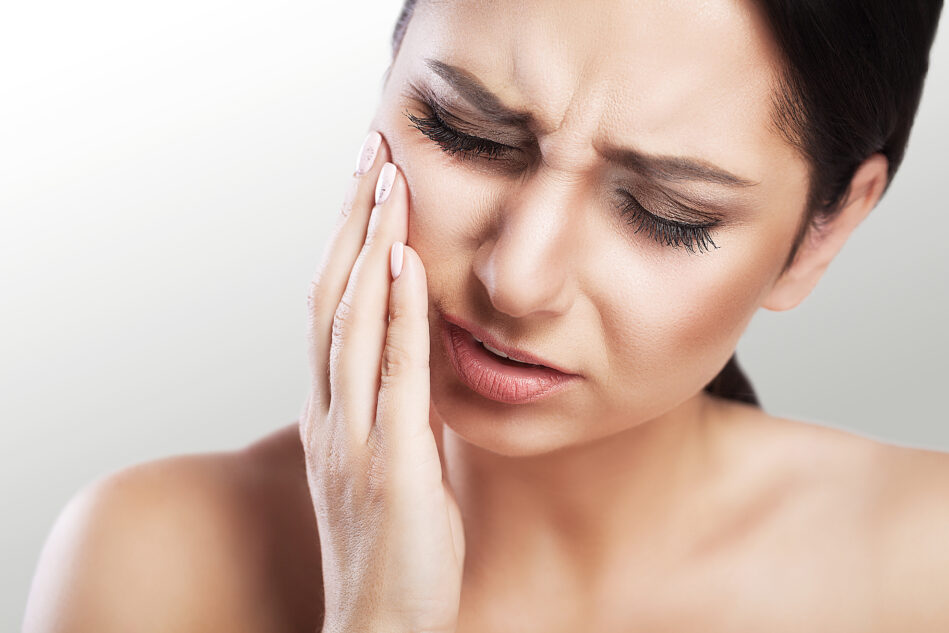MedShadow reader and blogger, Clara Morgan had a cavity a few years ago. When that cavity hit her nerve, she said “Oh my stars, was that a whole new level of ouch.” At first she treated the tooth pain with Tylenol but “it felt like putting a bandaid on a bullet wound,” she says.
She switched to a combination of natural remedies including peppermint oil, cold compresses, and swishing with warm salt water.
“I won’t lie, it was a challenging time,” she added.
Once upon a time tooth infections were frequently deadly. In 1908, they reportedly had a 10-40% mortality rate. Luckily, they’re rarely fatal these days, but toothaches can still be exceptionally painful. Here’s what you need to know about managing that pain.
Talking to Your Healthcare Providers About Tooth Pain
Despite the medical system separating most of your medical care from your dental care, your oral health is intricately tied to the health of the rest of your body. The steps you take to prevent dental pain, such as brushing twice a day and flossing once a day (as per the American Dental Association recommendations), can also help protect you from heart disease and maybe even dementia.
On the flipside, the treatments you use to manage a toothache also affect the rest of your body. Before you take drugs that may be recommended or prescribed by your dentist, make sure you discuss any and all treatments and supplements you take for other health conditions, whether they affect your mouth or not.
Causes of Dental Pain
“A majority of my patients report that they’d do almost anything to relieve their tooth pain,” says Nicole Mackie, DDS, a prosthodontist in Las Vegas, Nevada. “This is because the head and face (including the teeth) are richly served by the nervous system, making this an extremely sensitive area.”
Dental pain can be caused by:
- Gum disease
- Grinding teeth at night
- Infection
- Cavity
- Broken tooth
- Oral surgery
“Pain shouldn’t last much longer than a day or two after oral surgery, though it may take a couple of weeks to fully recover from your procedure,” says Shahrooz Yazdani, DDS, CEO of Yazdani Family Dentistry. “If you are still experiencing pain more than two days following your surgery, reach out to your oral professional for a check in.”
What to Do When Tooth Pain Starts
Anytime you have difficulty opening your mouth or tooth pain for more than two days, you should give your dentist a call and work together to determine a treatment plan, regardless of the pain’s severity. Heat, ice, OTC painkillers, and other strategies for pain relief will only act as a Band-Aid to help relieve that unbearable tooth pain until your dentist can treat the underlying cause of pain.
However, sometimes you may need treatment even faster than the dentist can provide it, and you’ll need to visit the emergency room. You should consider heading to the local emergency room if you have:
- Intense pain that doesn’t improve when you take over-the-counter (OTC) drugs like Tylenol (acetaminophen) or ibuprofen.
- Facial swelling
- Continuous bleeding
- Fever
Non-Drug Tooth Pain Treatments to Try First
Hydrogen Peroxide Rinse
You can try to get rid of a toothache in a few minutes by rinsing in Hydrogen peroxide. Hydrogen peroxide can help kill bacteria and lower inflammation. Dentists recommend purchasing a 3% hydrogen peroxide, then diluting it with two parts water (i.e. mix one cup of hydrogen peroxide and two cups of water) then swish in your mouth for about a minute and spit it out in the sink. Do not swallow it.
Beware that overdoing it by using too much hydrogen peroxide or rinsing too frequently can cause problems, too. It can wear away the enamel on your teeth and irritate your gums. In one case, an individual who used 3% hydrogen peroxide for more than two minutes and experienced chemical burns inside her mouth.
Salt Water Rinse
A saltwater rinse can help reduce inflammation to help relieve tooth pain fast at home. Dentists also use this solution after oral surgery, according to a small 2021 study. The rinse included seven grams of salt mixed into eight ounces of water. Trial participants rinsed with 15 milliliters for one minute, 30 minutes after brushing their teeth, each morning and evening, for one week.
Cold Compresses
As with many other types of pain, cold compresses applied to your jaw near the site of your pain may help reduce tooth pain quickly, explains Yazdani.
“There are definitely ways to increase your comfort and lower tooth pain,” he says, “such as cold compresses and head elevation.” Both should help reduce swelling.
Avoid Triggers
Not all foods affect your teeth the same way. For many people with toothaches, eating anything hard can be painful. Yazdani recommends eating primary soft foods. He also emphasizes that certain ingredients, such as alcohol, hot spices, or sugar, can irritate your mouth, even in softer foods. Avoiding these foods can help keep the pain manageable until you can address the underlying cause.
Clove Oil
Two small studies have found that clove oil (also called eugenol) can help relieve pain after tooth extractions. It relieves pain in a similar way as local anesthetics do. It also has antibacterial properties. Mackie suggests dabbing a small amount on a cotton ball and tapping it on the affected area.
Avoid swallowing clove oil, as it can cause serious side effects such as liver problems if consumed. Topical clove oil can also irritate your skin and gums.
Morgan initially tried clove oil, before switching to peppermint oil for her toothache, due to allergy-like irritation.
Medications to Treat Tooth Pain
OTC Pain Medications for Toothaches
The American Dental Association recommends non-steroidal antiinflammatory drugs (NSAIDs, such as ibuprofen) as the first option for treating tooth pain. Ibuprofen and acetaminophen may help reduce the pain in your teeth. According to one study, ibuprofen beat acetaminophen for lowering pain during the first few hours after wisdom teeth removal. Six hours after the surgery, a combination of the two drugs in one formulation worked best.
Side Effects of NSAIDs
If you take NSAIDs at high doses or for an extended period of time, you run the risk of gastrointestinal distress, bleeding, and kidney problems. But side effects associated with more typical NSAID use include stomach pain, heartburn, gas, bloating, constipation, and diarrhea. Taking your NSAIDs with food or milk can help these sensations. Dizziness, mild headaches, problems concentrating, balance issues and lightheadedness are also common.
Read more about the side effects of NSAIDs in MedShadow’s The Lowdown on NSAIDs for Pain and Need to Know: NSAIDs.
Side Effects of Tylenol
The main risk of taking Tylenol is liver damage, especially if you drink alcohol while taking it. While it isn’t common, one study in JAMA found that taking acetaminophen at the recommended dose for four days in a row could elevate your risk of liver damage.
Signs of liver damage include:
- Nausea, vomiting, or loss of appetite
- Fatigue or weakness
- Jaundice (yellowing of the skin or eyes)
- Pain in the upper right part of the abdomen
Read more about the risks and benefits of Tylenol in MedShadow’s Need to Know: Acetaminophen.
Nerve Blocks or Local Anesthetics
These are anesthetic drugs such as lidocaine, that the dentist injects near the area you have pain preventing your nerves from communicating pain signals to your brain. This will numb the area while the dentist treats the cause of your pain, but won’t affect the rest of your body.
There are several different types of local anesthetics used to prevent pain during and after dental procedures, but a Cochrane Review of several studies found little difference between them. If you receive a local anesthetic, you may not be able to feel sensations in part of your mouth for several hours after the procedure. Make sure you are careful to avoid burning the area with hot foods or biting your cheek, both of which will cause pain after the treatment wears off. You may also experience some tingling as the treatment wears off.
Side Effects of Local Anesthetics
Some types of local anesthetics such as Orajel (benzocaine), are available OTC. In this case, you’d rub the gel on your gums where you feel pain. Just because they are available OTC does not mean they are risk free. Be careful not to use more than the dose described on the packaging. In rare cases, benzocaine can kill you by dramatically lowering the amount of oxygen in your blood. Although it has been used in the past for teething babies, the risk of low oxygen is higher in young children than adults, so experts recommend against using it for your children (especially those under the age of 2).
Other side effects of benzocaine include:
- Low blood pressure
- Slowed heart rate
- Cardiac arrest
- Convulsions
- Drowsiness
- Dizziness
- Swelling
Antibiotics
Bacterial infections are often at the root of toothaches, and in certain situations oral antibiotics may be necessary to clear the infection, especially if it has spread and you’re experiencing symptoms such as a fever or swelling that’s not localized to just your tooth.
However, in many cases, dentists may prescribe antibiotics when they aren’t needed. For example, if a dentist is able to remove all of the bacteria when he or she extracts a tooth or does a root canal, a review of two studies found that prescribing antibiotics made no difference in pain or swelling after the procedure. The drugs also do not seem to help pain caused by nerve damage inside the tooth. Sometimes dentists also prescribe antibiotics as a precaution before and after procedures to prevent infections.
Side Effects of Antibiotics
Side effects of antibiotics range from merely annoying (mild rashes, minor skin irritations, or a short bout of diarrhea) to potentially life-threatening reactions (anaphylactic shock, for example).
Opioids
In its 2022 Clinical Practice Guideline for Prescribing Opioids for Pain, the Centers for Disease Control and Prevention (CDC) points out that in most cases, NSAIDs are more effective than opioids for treating dental pain. Given the serious potential side effects of opioids, including the risks of overdose and dependence, it’s best to avoid opioids, if possible.
However, if NSAIDs are not effective for you, your dentist may prescribe opioids for a limited time. The CDC emphasizes that dentists should prescribe the lowest effective dose for the shortest period of time necessary to manage your pain, and that he or she should discuss a plan to taper off of the medications with you upon prescribing. Make sure you discuss any other medications or supplements you may be taking with your provider, such as benzodiazepines for anxiety, which can raise your risk of overdose when used in combination with opioids.
Consider asking about naloxone, the overdose reversal drug, and be sure to tell someone in your household where you’ll store it so that he or she can administer it in the case of an accidental overdose.
Side Effects of Opioids Include:
- Accidental overdose
- Constipation
- Decreased testosterone, sex drive, and impaired sexual function
- Depression
- Dizziness
- Drowsiness, sedation
- Irregular menstruation
- Itching
- Memory impairment
- Nausea and vomiting
- Slowed breathing
- Suppressed immune system function
Signs of an Opioid Overdose Include:
- Slow, shallow breaths
- Blue tinted skin or lips
- Losing consciousness
If you see these symptoms, consider administering naloxone right away. If you’re wrong, and the individual isn’t overdosing, naloxone is unlikely to harm them. Read more about naloxone, the overdose reversal drug.






